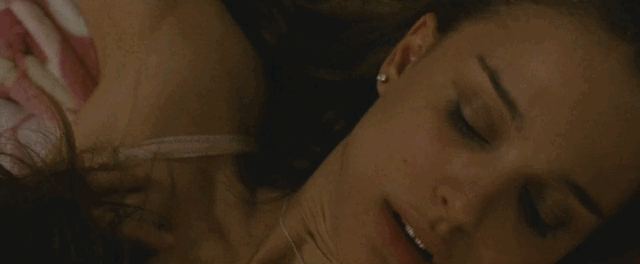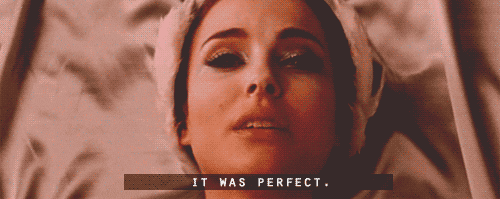Welcome to the second installment of Lights, Camera, ACTION. Each month, Rachel Vorona Cote chooses an erotic scene from film or television and walks you through its quirks and kinks, particularly as they pertain to female lived experience.
Darren Aronofsky’s “Black Swan” is the sort of film that scorns subtlety. Black, white, and a naïve, blush pink overwhelm each scene, reminding us of their archetypical relevance to the plot. The parallels between the ballet’s narrative and that of the film are, if not pat, insistent. Nina Sayers (Natalie Portman), delicate and vulnerable as eggshell, has been cast as the Swan Queen in her company’s production of Swan Lake. In her beauty and virginal timidity she perfectly embodies Odette, the White Swan; however, she must also cultivate the wild sensuousness required to perform Odette’s double, the Black Swan Odile. As Nina struggles to abandon the haven of self-restraint, she becomes fixatedly convinced that the company’s new dancer, Lily (Mila Kunis)—as freewheeling and passionate as Nina is bridled—will supplant her as the ideal Black Swan.
But subtlety is not a prerequisite for complexity. It’s true that some of the more erotically charged scenes are overly traveled. Vincent Cassel, brilliantly maximalist as the director Thomas Leroy, sexually manipulates Nina, asserting that physical awakenings and a healthy dose of masturbation will render her less inhibited. From the utter cheese of his dialogue—“feel my touch, respond to it”—to the camera’s focus on his slender, phallic nose, his intimate scenes with Nina are tired exhibitions of emotional and sexual abuse.
Yet because the film encourages Nina to loosen up (hell, don’t we all need to, to some extent?) the sexual charge between she and Thomas is almost presented as therapeutic. This could be true if Nina were not predominately characterized by her passivity. Women, in the paranoid world of “Black Swan,” cater to misogynist fantasies. They are double-crossing and suspicious of one another. Many revel in the failures of their fellow dancers, the humiliation of former prima ballerina Beth (Winona Ryder), who is forced into retirement due to age.
At home, Nina’s oppressive mother Erica (Barbara Hershey) bursts at the seams as she both treasures—vicariously—her daughter’s successes while also resenting her for them. As a fellow dancer who, unlike Nina, was never plucked from the corps, Erica paints a gallery of self-portraits in an attempt to locate a selfhood she cannot value without Nina. This selfhood is tethered to Nina’s dependency and approval — but also her bodily shame. Shattered by her own body’s inability to perform as Nina’s can, Erica fixates on Nina’s compulsive scratching and the curious rashes that emerge on her shoulder blades over the course of the film. (Surprise: wings ultimately emerge in these raw spots. Subtlety, I tell you.)
Would Nina’s consciousness be so fevered and crowded in another context? Perhaps not — but we aren’t meant to ponder that. Whether innate or learned, passivity is Nina’s guiding principle. Cowering under her mother’s gaze, she never claims the privacy to explore her sexuality; even her bedroom, crowded with the dead eyes of pastel stuffed animals, seems to demand that she perform the role of a “sweet girl” embracing the underside of her mother’s thumb. She is convinced that slavishly following technique will, by way of arithmetic, produce a “perfect” dancer. When Thomas counters this definition, explaining, “Perfection is not just about control. It’s also about letting go,” Nina cannot conceive of this possibility.
Indeed, Nina’s initial expressions of desire register not so much as conscious succumbing but as bodily possession. When Thomas first kisses her, she surprises them both by fiercely biting his tongue (Confession: I love this. Screw you, Thomas). The morning after he instructs her to masturbate, she, though reticent at first, soon humps her bed with such fervor, it’s a toss up as to whether she’ll generate enough energy to float away or bore a hole in the mattress. Luckily, that mattress survived.
The first time I watched “Black Swan.” Nina’s first double click inspired in me hallowed womanly reverence. “YEAH GIRL!” I yelled inside my head. “You got this! Worship your pussy like the goddess it is!” But horror of horrors, Nina spies her mother dozing in the corner and tumbles back under the covers before Erica catches her daughter’s hand in the vaginal cookie jar. It’s a scene equal parts creepy—Are you serious, Erica? Go to your room!—and ludicrous, but by now we are meant to understand: the “Black Swan” exists within Nina and is seeking an exit. It’s a cliché as old as narrative itself: the reconciliation of two selves, but it’s a compromise so fundamental and individual that it generally retains interest.
As we see, Nina responds with characteristic passivity to these first glimmers of sexual urgency. Post-bite, she jettisons herself from Thomas’s office, panting apologies. Though masturbation is inherently self-driven, Nina’s first attempt is framed less as a decision than as curiosity that swivels into physiological desperation. When, after noticing her mother, she bundles herself underneath the covers, the camera directs us to her eyes, terrified and searching. She responds almost gratefully to Thomas’s second, more intimate advances during a rehearsal, but, as Thomas notes, she only submits — never seduces. Nina gradually becomes aware of her submerged erotic self, but she neither trusts it nor wishes to accept its residence within her.
Her imagined encounter with Lily crystallizes this psychological disavowal. From the film’s beginning, we are urged to interpret Lily and Nina as doubles. Although named for chastity and virtue, Lily’s demeanor lays bare her rejection of self-denial and restraint. She speaks with abandon about sex and irreverently calls Thomas “a prick.” She pirouettes with her hair down. But—oh Darren, you trickster—her name invites connection with Nina, whose own means “little girl.” And the tattoo on Lily’s back, a pair of wings, reminds us of the rashes on Nina’s shoulder blades — the protracted irritation of wings unable to break skin.
Nina regards Lily with suspicion and, once Thomas describes her as Nina’s opposite—“she’s not faking it”—jealousy. It’s never clear to what extent her reservations are grounded. But Lily does seem to offer Nina her friendship, and the latter finally agrees to join her for dinner. As we might expect, Lily, in an effort to relax Nina, plies her with ecstasy and liquor, and the two women sink together into an orgiastic neon dance party. Nina comes to in the midst of kissing a stranger and runs out into the street, Lily in close pursuit.
Others more perceptive than me may have assumed that Nina’s exit from the club signaled an entrance into fantasy. Frankly, I was desperate for Nina and Lily to hook up; I cannot watch “Black Swan” without becoming deeply invested in both Nina’s sexual education and release from her mother’s infantilizing claws. But I also have no patience for lesbian sex scenes that are written for men. So, at this point in the film, Darren and I are at an impasse.
Nina believes that she and Lily catch a cab together, both reclining in perfect, dreamy intoxication. Lily attempts to massage her between the legs — Nina stops her, but entwines their hands. When they return to Nina’s apartment, Lily retreats to her bedroom as Nina responds defiantly to her mother’s inquiries. In the heat of the fight, she dashes to her room and secures the door with a wooden bar.

And so begins Nina’s drug-addled cunnilingus fantasy: Nina kisses Lily—perhaps her first agential sex act—and the two hastily undress one another. Of course the requisite lingerie and sweetly pitched moans accompany the process. Despite Nina’s initiative, it is, unsurprisingly, Lily who positions herself between Nina’s legs, finally driving her to orgasm. But amidst pleasure, the boundaries of Nina’s world fizzle. Lily’s back contorts, her winged shoulder blades jutting like shark fins just beneath the skin. She sits, taking in Nina with a sinister smile. “Sweet girl,” she warbles in a slightly obscure voice, just before transforming into a second, darker Nina who smothers the original with a pillow.
The next morning, Nina wakes up alone and, once at rehearsal, confronts Lily about leaving without warning. (A brief aside: I appreciate the half-breath respite from heteronormativity here. Sleeping with another woman doesn’t seem to unsettle Nina; rather, she’s upset that Lily abandoned her in the morning.) Lily reveals that she spent the night elsewhere and delights in the realization that Nina had a “lezzie wet dream” about her.
But really, Nina did not. It may be that she’s attracted to Lily and, yes, it’s Lily’s likeness that she kisses and that she lets pleasure her. However, those last ghoulish moments, when “Dark Nina” appears, demand another interpretation: at base, Nina was dreaming of herself.

Nina cannot fathom possessing the nuance demanded of her to perform the role of Odile. After supplanting Beth as Swan Queen, she pockets trinkets and jewelry from her old dressing room in a superstitious effort to absorb Beth’s majesty. If Beth once was “perfect” as Nina desperately wishes to be, then her possessions are, perhaps, enchanted with whatever vague essence rendered her so.
Lily, too, embodies a vessel. But while Beth is a well from which Nina greedily draws, Lily offers her a receptacle for her own erotic impulses. After returning from the club, Nina, in all likelihood, passes the night in a feverish masturbatory frenzy (girl, we’ve all been there). And once more, Nina cannot, psychically, come to terms with what that means. It’s far safer to conceptualize masturbation as seduction, to displace sexual agency into a body that seems a more fitting and comfortable repository for it. Yet, as Lily’s visage fades into a copy of Nina’s, it’s clear to us that Nina cannot repudiate her more lustful self — and if that self seems monstrous and bloodthirsty, it is Nina’s fear that has molded her in that image.
Because, for all its faults, “Black Swan” rejects the narrative of Swan Lake: a narrative that defines virginity as goodness and sexual agency as annihilating. But Nina, we know, reveres this story, believes in the beauty of Odette’s pure and love-driven suicide. Investing in this binary is, too, an unconscious means of self-preservation, albeit an impotent one. Too fearful of what she might become, Nina cannot reconcile white with black; she cannot trust in shades of grey. But Nina also cannot indefinitely suppress her desire, warped and terrifying though it seems. Ultimately it will witch itself into the murderous shadow she abhors, and her only recourse will be to claim the agency to fight it to the death.
And so she does. Convinced that Lily is pursuing her role, she imagines her in her dressing room, dressed in her Black Swan costume. They fight; Nina stabs her to death with a glass shard; and she dances Odile’s solo to breathtaking and sensuous perfection. When she returns, though, the blood has disappeared from the floor. Lily drops by to offer her congratulations. Nina, at last, understands. Watching the blood seep from her own deep stomach wound and spill across her costume, she cries — but with relief. The war within her is finished, and she has danced both the White and the Black. Now she is prepared to decide who she wants to be. She settles back into her chair and resumes applying her makeup. The choice, of course, is simple: she is the woman who will dance her part to its conclusion, even if it almost promises death.
Because that—that is perfect.

Original by Rachel Vorona Cote

